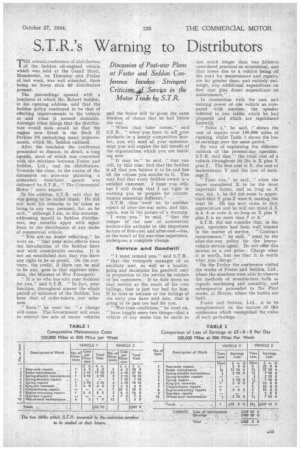S.T.R.'s Warning to Distributors
Page 35

If you've noticed an error in this article please click here to report it so we can fix it.
THE annual conference of distributors of the Seddon oil-engined vehicle which was held at the Grand Hotel, Manchester, on Thursday and Friday of last week, was well attended, there being no fewer than 63 distributors present.
The proceedings opened with a luncheon at which Mr. Robert Seddon, in his opening address, said that the Seddon policy continued to be that of effecting improvements to the 'vehicle as and when it seemed desirable. Amongst other things that the distributors would note would be that the engine now fitted is the Mark II Perkins P6 embodying many improvements, which Mr. Seddon outlined.
After the luncheon the conference proceeded to discuss, in detail, a long agenda, most of which was concerned with the relations between Foster and Seddon, Ltd., and its distributors. Towards the dose, in the course of the discussion on post-war planning, a somewhat trenchant speech was delivered by S.T.R., " The Commercial Motor " costs expert.
In his address, S.T.R. said that he was going tp be rather blunt: He did not wish his remarks to be' taken as being in any way personal, for, as he said, " although I am, in this instance, addressing myself to Seddon distributors, my remarks apply with equal force to the distributors of any make of commercial vehicle.
" You are no doubt reflecting," he went on, " that your sales efforts since the introduction of the Seddon have met with considerable success. It is not an established fact that you have any right to be so proud. On the contrary, the credit, if there can be said to be any, goes to that supreme salesman, the ftlinister of War Transport.
" It is he who has sold your Seddons for you," said S.T.R. " In fact, your function, throughout almost the whole period of existence of the Seddon, has been that of order-takers, . not salesmen.
" Soon." he went on, "a change will come. The Government will cease to control the sale of motor vehicles and the buyer will be given the same freedom of choice that lie had before the war, " When that time comes," said S.T.R., " when you have to sell your products in a keenly competitive market, you will need all your salesmanship; you will require the full benefit of the organization which you are build-, ing now.
" It may he," he said, " that you will, by that time, find that the Seddon is all that you believe it to be and has all the virtues you ascribe to it. You may. find that every Seddon owner is a satisfied customer. I hope you will; but I still think that I am right in warning you to prepare for circumstances somewhat differen t.'' S.T.R. then went on to another aspect of after-the-war sales, and this, again, was in the nature of a warning. " I warn you," he said, " that the temper of the user of commercial motors—his attitude to the important factors of first-cost and after-cost--has, as the result of his war-time experience, undergone a complete change.
Service and Goodwill I must remind you," said S.T.R., " that the transport manager of an ancillary user, as well as a haulier, gain § and maintains his goodwill only in proportion to the service he renders to his customers. If he falls down on that service as the result of his own failings, that is just too bad for him. If he does so because of the failings of the lorry you have sold him, that is going to be just too bad for you.
" War-time conditions," he went on, " have taught users two things—that a vehicle of any make can be made to
last much longer than was hitherto considered practical or economical, and that losses due to a vehicle being off the road for maintenance and repairs, are far greater than, and entirely outweigh, any additional expenditure on first cost plus direct expenditure on maintenance,"
In connection with the cost and earning power of one vehicle as compared with another, the speaker referred to two tables which be had prepared and which are reproduced herewith.
" Table 1," he said, " shows the cost of repairs over 100,000 miles of running, whilst Table 2 shows the loss of earnings over the same period." • By way of explaining the different outlook of the present-day operator. S.T.R. said that " the total cost of a vehicle throughout its life is X plus Y plus Z. The first cost is X, the cost of maintenance Y and the loss of earnings Z.
" Time was," he said, " when the buyer considered X to be the most important factor, and so long as X was, say, 1, he did not seem to appreciate that Y plus Z were 9, making the total 10. He has now come to that appreciation and he will not mind if X is 4, 5 or even 6, so long as X plus Y plus Z is no more than 7 or 8."
S.T.R. did not consider that, in the past, operators had been well treated in the matter of service. " Contract maintenance," he said, " must be the after-the-war policy for the heavyvehicle service agent. Do not offer this service at a cut price. Charge what it is worth, but see that it is worth what you charge."
On. the Friday the conference visited the works of Foster and Seddon, Ltd., where the members were able to observe the methods of manufacture both as regards machining and assembly, and subsequently proceeded to the Pilot works, at Bolton, where the bodies are built.
Foster and Seddon, Ltd., is to be complimented on the success of this conference which exemplified the value cif such gatherings.




















































